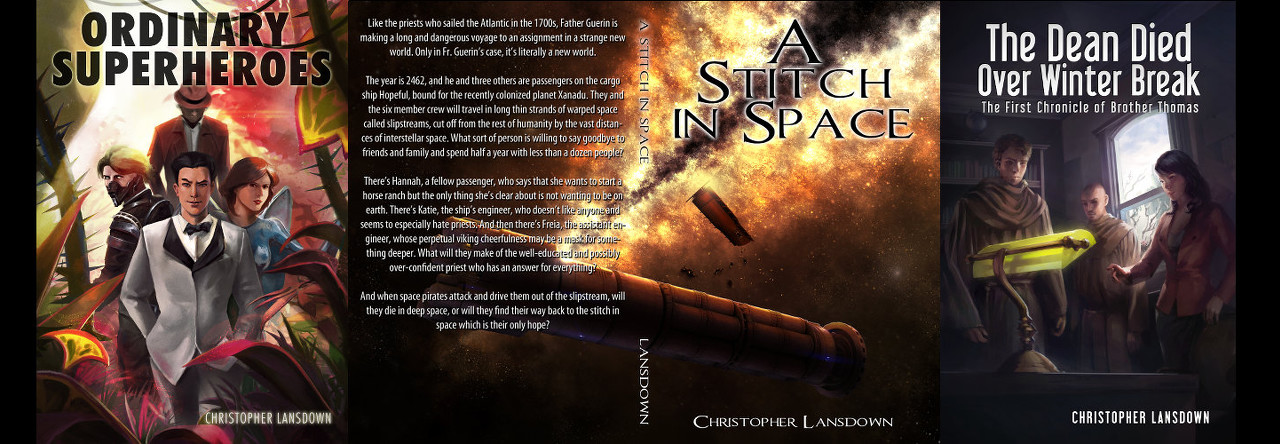Midway through the fourth season of Murder, She Wrote is the episode, Indian Giver. It is a Cabot Cove episode and concerns the esoteric subject of historical land grants. It opens with a helicopter shot of a forest near Cabot Cove:
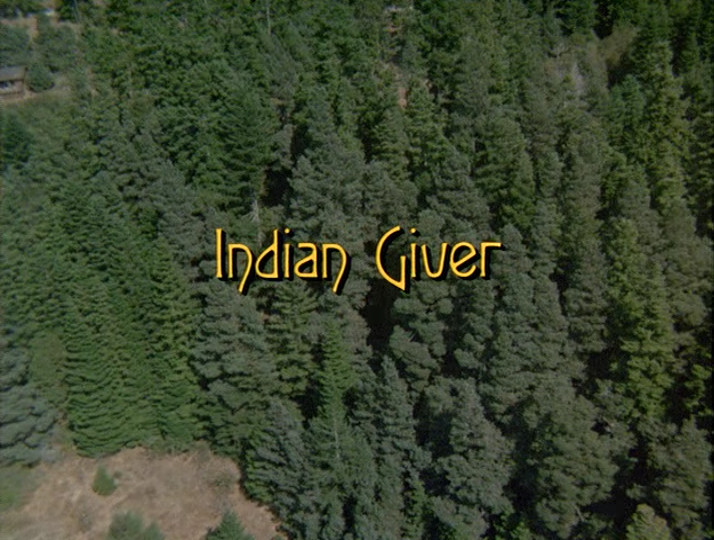
The helicopter moves around and closes in on our eponymous Indian:

We later learn that his name is George Longbow. This is a curious name for an American Indian since the longbow is an English weapon of only historical interest by the time that the English made contact with anyone in Maine (the first English colony was Popham Colony in 1607, though it only lasted 14 months).
From this high place he looks down on Cabot Cove, where he will soon make his appearance.

This is a very interesting view of Cabot Cove. Obviously it’s only a part of it, but it’s curious to consider that this is the place that can supply a high school large enough to have a football team (see When Thieves Fall Out).
Down in Cabot Cove, they’re having a celebration, possibly Founder’s Day, of the long history of Cabot Cove. There’s a shot of the crowd which is quite interesting:
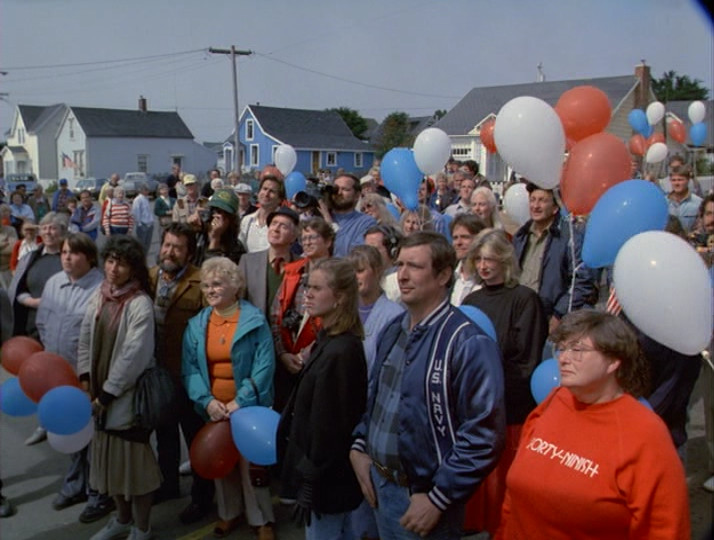
It’s an interesting picture of what small-town America is supposed to look like, back in the mid 1980s. That said, it may even be somewhat accurate to whatever small town in California it was shot in; it is not that uncommon to hire extras on location—you wouldn’t want to pay to transport people with no lines, after all.
The mayor, Sam Booth, begins to give a speech when some boys run up and say “Hey look! Look what’s coming! Look!” The camera then looks down the street and George Longbow comes galloping around the corner:

I know that I can be a little prone to nit-picking, but I can’t imagine how the boys saw George from far enough away that they had time to run up to shout about “what’s coming”. Horses can’t gallop at full speed on pavement, but they still move way faster than ten year old boys do. Also, I can’t help but wonder how that derelict car with the bright green hood got into this shot. George then gallops down main street to the gathering, though he brings his horse up to a walk as he comes to the crowd, which parts for him.
George then throws his spear into the podium.

I’ve got to say, that’s a pretty good shot. It’s hard to see the actual distance, but I’d guess it was about ten yards, and mounted on horseback, too. George has to be either very good or very reckless to have taken that shot; had he been about 8″ higher he’d have skewered the mayor, and had he been about 18″ lower he might well have run him through the leg, which could be fatal if he hit a major blood vessel. George then turns and gallops away.
The white thing behind the feathers turns out to be a piece of paper, which Jessica takes off of the spear and reads. She then says “oh dear.” The mayor tells everyone that it’s nothing, but then he, Doc Hazlet and Amos drive off. On the drive over to wherever they’re going, the three discuss the piece of paper. It’s a photocopy of a land grant. “Granted to chief Manitoka and his heirs in perpetuity, all those lands ending at the waters edge which can be seen from the hill of the god that creates rain, also known as Algonquin peak, to the east, to the north, and to the south as far as the eye can see on a day of bright sunshine.”
Sam appoints doc Hazlet and Jessica Fletcher as a committee of two to get to the bottom of whether the land grant is authentic. There’s no indication of who actually made this land grant, but I suppose we can’t have everything. They go to an expert at a nearby university:

Unfortunately he can’t speak to whether the land grant is genuine until he examines the original. Jessica thinks that, since the Indian is media savvy, he may put in an appearance and be willing to show the original document if he gets a big enough audience. Jessica persuades Sam to call a town hall meeting for that night, which he does.
We then meet one of the Cabot Cove characters in the episode:

His name is Norman Edmonds, and he works for and/or owns a bank that holds most of the mortgages in Cabot Cove. (If you recognize him, the actor played the dentist in Night Of The Headless Horseman.) He’s talking with Harris Atwater, but he isn’t much of a character in this episode. He does drive some of the plot, though. His company is going to build a $17 million resort hotel in Cabot Cove, but not if there’s any legitimacy at all to the land grant.
Attwater runs into Addison Langley and his wife Helen:
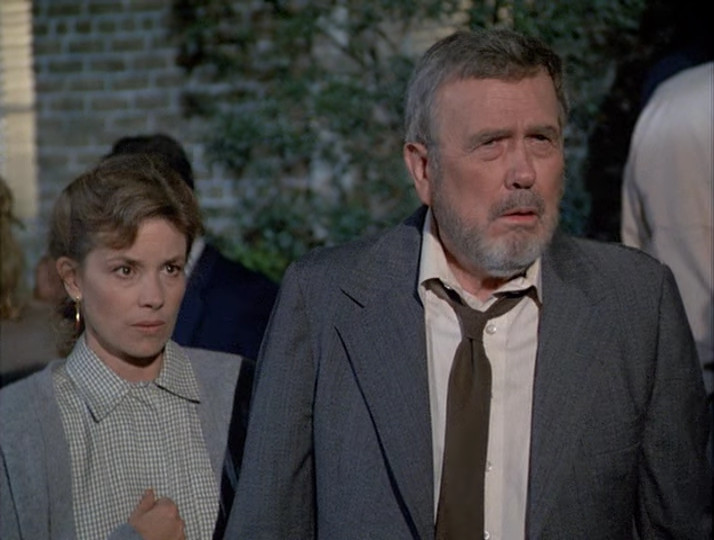
Addison has a piece of land that he wants to sell to Attwater, but Attwater isn’t interested until the business with the Indian land grant is resolved. Addison is wholely unreasonable, possibly because he is drunk. He seems violent, too. He starts berating her for interrupting while he was talking business, and her brother walks up and interrupts.

His name is Tom Carpenter, and he’s none too happy about the way that Addison treats his sister.
At the last minute George Longbow shows up, this time dressed in a suit and carrying a briefcase.
the shot of the Cabot Cove town meeting is interesting:

As is obvious, the age skews older, here, as is typical for all kinds of government, including local government. That said, unless the citizens of Cabot Cove are generally uninterested in George Longbow’s claims, Cabot Cove is not that big of a place, and certainly not the sort of place to have its own high school large enough to have a football team.
The angry members of the community speak up and demand… what, is not really clear. Some sort of undefined end to the threat hanging over them.
George speaks up. It turns out that the land grant is from 1758. Manitoka helped the British to win a major battle against the French and the British governor-general granted the land that includes Cabot Cove to Manitoka and his descendants, and George is the eleventh direct descendant of that chief. In response to a question from Jessica about what he intends to do if his claim is legitimate, he says that he’s not planning to evict people from their owns, only to have them pay rent.
It’s a bit difficult to take this premise seriously, since a British land grant from the mid 1700s is not, in practice, going to overthrow everything that’s happened in the two hundred and thirty years since. The hundreds of years of not acting like the land belonged to them by Longbow’s ancestors will constitute abandonment of title. If nothing else, adverse possession will render the whole question moot, as the people of Cabot Cove clearly were in open and notorious possession of the land. Even if we were to set aside all of that—and it would be effectively impossible to set it aside in practice—he’s going to have a hard time proving that none of his ancestors ever sold any of their land to any of the founders of Cabot Cove.
There are some other issues that might make George unwilling to press his claim, even apart from the claim being completely untenable. For one thing, he’s going to have one heck of an inheritance tax bill to pay. For another, he’s going to have a heck of a lot of legal liability for all of the accidents that happen on his property owing to his negligence in keeping the place in good repair.
The residents of Cabot Cove apparently are not familiar with basic law concerning real estate—let me take this opportunity to mention that it’s a great idea to take one business law course, by the way—so Addison Langley insults George, who gets into a shoving match because he objects to the description Langley used of him, “redskin.” This fight is broken up, and the meeting adjourns to a room with a select few:

It comes up that George met Donna, the expert’s daughter, while he was doing research at the university. We then move onto proof. He takes out of his briefcase the original document, which he found several months ago among his late mother’s possessions. He hands it to the professor. The professor is professorly—it’s “very interesting.” It appears to be genuine but he’ll have to conduct some tests.
George thought of that, though. He hands the professor validation reports from several experts. The professor reads through the reports and concludes, “if all this checks out, it appears that this man does indeed own Cabot Cove.”
Norman (the banker) shouts that there are courts in this country, yadda yadda. George replies that he’s a graduate of Harvard law school, so he’s not intimidated by legal fights. If he’s telling the truth—and apart from the fact that he should be aware of the laws about adverse possession—while he might not be intimidated by the threat of legal action, he should be aware that legal action tends to be very slow.
This is apart from the threats of legal actions being backwards. It’s not up to the people (putatively) squatting on what he claims to be his land to sue Longbow, it’s up to him to sue them to either evict them or force them to pay rent that they owe him.
More bickering ensues which Jessica interrupts to ask Longbow what he intends to do, and he says that he intends to assess a rent on every landowner of one half of one percent of value, and the average resident will pay only $200 per year. This is downright silly, given how much in property taxes he’s going to owe, the maintenance he’s going to be responsible for, etc. I’m really starting to question whether he actually went to Harvard law school. If he did, I’m certain that he never took any basic business accounting classes at wherever he got his undergraduate degree.
The meeting ends, rather than concludes. Outside the building, George is accosted by a bunch of angry townsfolk. Jessica tries to stop them, calling them by name, but they are in no mood to listen to her. Donna, the professor’s daughter, drives up in a car and calls to George. He hits, with his briefcase, a townsperson who lunges for him, then runs into the car, which pulls away.
The next scene is of George and Donna arguing. She feels used, and he admits to not telling her about the land grant because he didn’t know how she’d react. (what other motive could he have had for not telling her?) She asks if he has any sense of self preservation, and he says that he has lots, which is why no one knows where he’s staying. On the other hand, he didn’t seem to have much of an escape plan from the town meeting, and he’s implying that he’s staying not that far away, rather than in, say, Portland or some other large city in Maine where the police don’t have a dog in the fight. Heck, Obituary for a Dead Anchor episode establishes that Cabot Cove is only a six hour drive from New York City. He could have stayed in New Hampshire or even Massachusetts and been a reasonable drive away from Cabot Cove. He had no real need to be nearby, if he actually had a sense of self preservation.
Donna has a fun line, “I hope that your reign as emperor of Cabot Cove is a long and happy one.” He asks her to drop him off at where his pickup truck is parked outside of town. (Was his plan for leaving safely really to walk all the way to his pickup truck???) She agrees, but first gives him the warning to be careful. The people of Cabot Cove feel threatened, and it doesn’t take a whole lot of fear to turn a crowd into a mob.
The next scene is in the motel room in Cabot Cove of Donna. Her father drops in and asks why she didn’t tell him about George, and she says that she did, twice. He just didn’t listen. He asks if there’s anything that he should know about her and George, and she says no, they’re just friends. (The scene is actually well written, with good characterization; they offend each other but immediately apologize.) She also didn’t help George with the land grant. he bids her a good night, but instead of going to his room, he goes off somewhere. We don’t see where; the next scene is in Cabot Cove in the morning.
Jessica is going for a morning walk when she pauses because she sees Helen Langley and Attwater talking. The conversation over, Helen then walks back to her house and trips over nothing:

I know I’m nitpicking, here, but her weight was already on her front foot when she started to “trip” on her back foot. Jessica runs up to help her and Helen explains it “I just got a little dizzy, that’s all.” It’s funny how “woman trips” was just a plot point that writers would use back in the day. I think that it a sort of fashion; I don’t recall seeing a woman tripping over ordinary ground being a plot point in movies from the 1930s or 1940s. The apotheosis of this must be the novel Twilight, in which the protagonist running in a forest resulted in her falling so many times her arms and legs were covered in scrapes, and when she was about to be assaulted by a gang of people a block and a half over from a movie theater she adopted a fighting stance rather than running to safety because she didn’t expect to be able to run a few hundred feet on smooth pavement without falling (and she was wearing sneakers, so improper footwear was not an excuse).
Anyway, Helen tripping is really just an excuse for Jessica to see that Helen’s forearm is covered in bruises.

Jessica walks her inside and then gets her a cup of tea. As she’s going into the kitchen to get the tea, we see it in clue-vision:

Murder, She Wrote occasionally does artsy shots but they never crop out the top half of a person without good reason. There’s a pretty good chance that either the murder victim has wet paint on them, or someone who shouldn’t have been visiting Helen will have wet paint on him.
Jessica notices that her eye looks puffy, too, which Helen attributes to doing a lot of crying over the Indian business. Jessica observes that Helen and Addison are fixing up the kitchen, which will look lovely, and Helen says that it’s her handiwork. “Ad’s a dreamer, not a doer.” Helen pauses, looks like she’s about to cry, then says that it’s no secret that Ad’s been drinking again. She hasn’t even seen him since the night before.
She also explains, after a question of Jessica’s, that a few years back Addison got the idea that a piece of land by a creek would be worth something, so he bought an option on it, and it turns out that’s the exact piece of land that Mr. Attwater wants to build his resort on.
In the next scene, Jessica goes over to police headquarters, where Seth, Amos, and the mayor are already in conference. There’s the minor news that the professor left town an hour ago after getting a call from Norman Edwards. A call then comes in that there’s trouble over at city hall, concerning Addison Langley, and the doctor better go too.

There is no way, if that blow from the spear could have killed Langley, that it did so with that little blood. Jessica, instead, notices lots of sand on Langley’s feet (that the camera didn’t show us). Apparently there are traces of sand all along the floor and out a side door.
Seth tells Jessica that Langley definitely didn’t die here, as there isn’t enough blood. He’s right, of course, but he could have gone a step further and said that he wasn’t killed with the spear, either, for the same reason. (To be fair, though, in a stabbing wound much of the bleeding can be internal.)
Amos walks over and asks if there’s anything else he should know about the body, like was there any bruising. Seth says no, just a little varnish on one hand. The time of death was midnight, give or take an hour or two.
Jessica is on her way into somewhere when she runs into Mr. Attwater. Jessica accuses him of the murder (her phrasing is just that the murder is very convenient), and he takes reasonable offense.
In the next scene a truck full of Cabot Covers spot George Longbow in his truck and run him off the road, then chase him down on foot. They bring him, beaten and bloodied, to the Sheriff’s office.
While that’s going on, Jessica tracks Norman down. He’s working on something relating to a mortgage on a house where a nice couple from Boston is buying it. Jessica is surprised that he’s intending to hold the mortgage, given the uncertainty, but Norman is certain that Longbow will pose no more trouble. Jessica asks why everyone in Cabot Cove is so certain that Longbow killed Langley.
I’d like to know why they think that George Longbow having murder Langley would in some way invalidate his property claim. I could see that if this was England during the golden age of detective fiction where Longbow would be hanged for the murder in a few weeks and, dying without issue, his property claim would go away. (More properly the land would revert to the crown, but close enough.)
Jessica grills Norman about his phone call to the professor, and he admits that this morning he offered the professor fifty thousand dollars for irrefutable proof that George Longbow’s claim is fraudulent. Jessica is shocked at that amount of money, and Norman replies, “if that man is who he says he is, my bank is ruined. I’m ruined.” It was a little dense of Jessica not to know this, but I think the goal here is to set Norman up as a suspect.
And to think he’d only have had to pay a lawyer a few hundred dollars! Seriously, they bring in a university professor who’s an expert on Indian history, but no one thinks to ask a lawyer anything. There literally isn’t a lawyer character in the entire episode.
At the Sheriff’s office, Amos is none too happy about the condition in which the people who brought Longbow in delivered him. They show no repentance and Amos doesn’t push the matter, though.
A few minutes later, Tom (Helen’s brother and Addison’s brother in law) shows up with Longbow’s truck. He returns Longbow’s wallet, keys, etc.
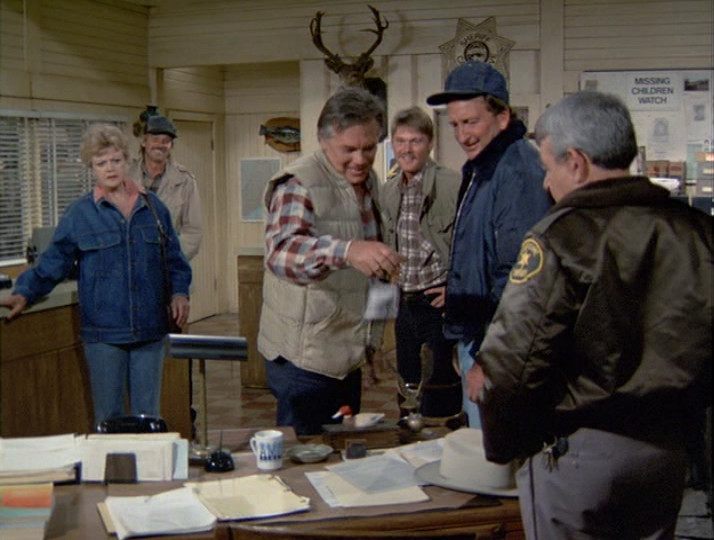
Jessica goes and sees George in the jail cell, because apparently no one thought that medical attention was appropriate for Longbow. Seriously, people can die from beatings due to internal bleeding. Bringing him to the hospital (in police custody) would have been entirely appropriate. Jessica’s speech is a little odd, too. Right after she sits down next to him, she says:
Now, listen to me, young man. At the moment, you and I may be the only two people in Cabot Cove who think that you are innocent of this murder. But retreating into stony, self-righteous silence isn’t going to help the situation one bit. Now, you’re much too intelligent to commit such a stupid murder. Now, suppose you tell me the truth, starting with why you really came to Cabot Cove.
He tells her that he doesn’t want to bilk the people of the town for his own personal gain. The money is to be used to fund a scholarship program for Indian youth who otherwise wouldn’t get a chance to go to college. Jessica asks why he used such a confrontational way to open up negotiations, and he said that if he had used conventional means to approach the “town fathers” he would have just been ignored.
Given that the only way to enforce his claim would be through the courts, that really wouldn’t have mattered, though. I’m starting to have my doubts about him being too intelligent to commit a stupid murder. If it weren’t for the varnish on the victim’s hand, which presumably is a continuity error from “wet paint” we saw in Helen’s kitchen, I’d start suspecting George of the murder.
Jessica asks where he was at the time of the murder, and if he can prove it. He was at a motel, and he arrived there at 11:30, after the office had closed, so he can’t prove it.
Amos interrupts saying that he just got a call from the mayor and that they’re to go there right away because the professor has news. Jessica gets up and tells George that she believes him and she’ll do what she can for him. Since he doesn’t know her from Eve, I’m not sure how comforting that is to him.
On their way to their meeting, Amos tells Jessica that his deputy found beach sand in the back of George Longbow’s pickup truck, the same sand they found on Ad Langley’s body.
At the meeting, the professor says that George Longbow is a fraud.
The land grant is genuine enough. No, I’m talking about Longbow himself. Do you remember the flu epidemic that hit this country in 1918, especially in the northeast? Thousands died in this area, and particularly hard hit was the Indian population. The survivors were adopted by the few families that remained intact. Well, under the circumstances, Longbow cannot possibly claim direct and provable lineage to Chief Manitoka.
I don’t see how this is supposed to make such a claim impossible. Longbow could have been from a line that moved elsewhere in the early 1900s. Perhaps he’s trying to claim that when so many were killed by the flu of 1918, all of the Indian birth records were destroyed, and so no one can prove ancestry back that far? But why would the flu destroy Indian birth records? (If, indeed, such records were even kept.) Of all the ways to defeat this claim, this seems like the least certain way to do it.
The mayor and the professor go off to talk to George Longbow. Jessica and Amos pick up George’s motel key and go off to search his motel room. There are shoes with beach sand on them, and there’s beach sand around the floor of the motel, too. There’s only one problem.

The soles of the shoes are gummed soles, and there isn’t a trace of sand on them. (Gum soles are, by the way, soles of shoes made from natural rubber, which is very durable and very sticky, giving good traction. These were what sneakers used to be made from before the switch to the lighter polyurethane.)
Jessica is now sure that George Longbow is being framed.
She and Amos go to Helen’s house. Her brother, Tom, is there, keeping his sister company. Amos doesn’t believe in beating around the bush, she he accuses Helen and Tom of being up to the framing of George Longbow up to their hip pockets.
Jessica points out that Tom knew the motel that George Longbow was staying at because he arrived separately, carrying the motel key and George’s wallet. He used the key to plant the false evidence.
How the timing on this works out, I have no idea. Presuming that he didn’t just donate his own shoes to frame Longbow, he would have had to have been carrying around sand with which to frame Longbow when he and his friends were looking for Longbow to not have to drive over to the beach to get some. Even if he did that, he only arrived slightly after Longbow was brought to the Sheriff’s office, and he had to get Longbow’s truck out of the ditch that it had been driven into, on his own if he didn’t wait for a tow truck.
Jessica points out to Helen that the Sheriff can prove that she was involved, since varnish was found on Addison’s hand and there was wet varnish on the furniture that she was refinishing. Jessica is also pretty sure that no matter how hard she scrubbed she couldn’t get Addison’s blood out of the kitchen floor. Jessica suggests that she tell them what happened—by the way, never take legal advice from Jessica Fletcher—and she does.
Addison came home late last night after walking the beach looking for George Longbow. He really wanted to hit someone and she was the only one around, so he hit her. He wouldn’t stop, so she grabbed a kitchen knife and stabbed him.
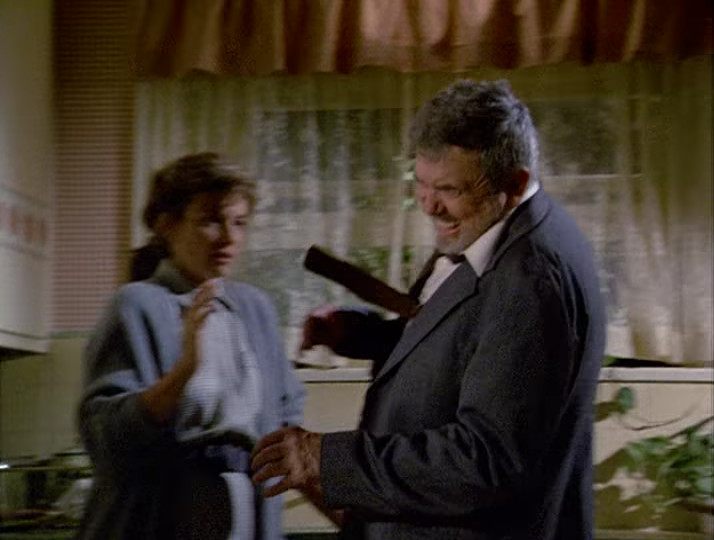
She then called Tom. She was out of her mind with fear when he got there. He then explained how he covered up the murder and framed Longbow, stabbing the spear into the kitchen knife wound to cover over the real cause of death.
There is an ending scene with Seth, Jessica, George Longbow, and Donna.
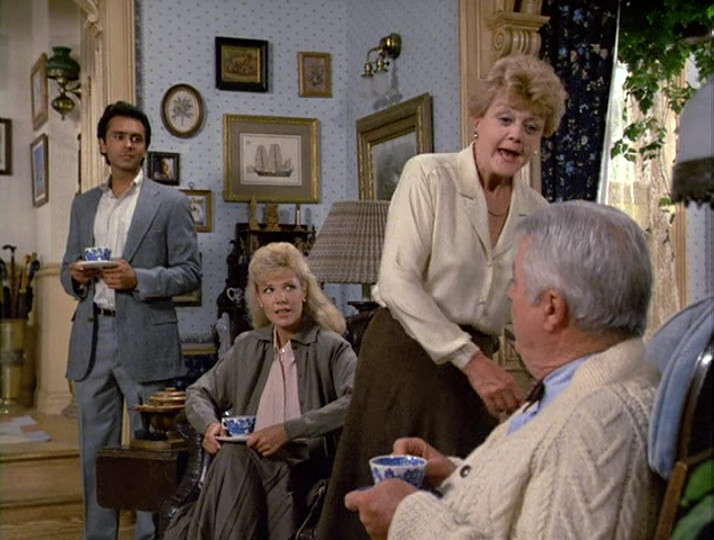
Jessica just came from the telephone, and she brings the news that Attwater’s company has been put off by the murder, and are now exploring property in New Jersey. Because murders don’t happen in New Jersey.
Seth and Jessica are thrilled, since they hate anything that brings more people to Cabot Cove. George and Donna have to get going, and Seth offers to drive and Jessica is coming with them, so they go over to Donna’s hotel.
Jessica asks George and Donna what their plans are. They don’t have any solid plans yet, but they’re working on it.
Jessica also mentions to George that there’s a lot of support for the idea of forming a scholarship for worthy young American Indians, and they’ve already formed a committee to get it going. George asks Jessica if she has an Algonquin blood in her. She says that with her complexion she very much doubts it, but if she did, she would be very proud of it.
The professor then comes into the scene and explains that he had gotten halfway back to the university, then turned around. He apologizes to Donna—heaven knows for what—and asks if they can go inside and have lunch. They can make it a table for three. Donna is overjoyed at… something. She says, “Come on, George. I think we’re about to negotiate a peace treaty.”
The three of them then walk into the hotel arm in arm. Once they’re gone, Jessica and Seth start to go home. Jessica asks Seth why, when everyone else was terrified that they were going to lose their homes, Seth was as calm as a mountain lake. He replies that he’s much too old to get caught up in that kind of hysteria. Besides, he rents. Despite Jessica not laughing, we go to credits.

This is definitely not one of the better Murder, She Wrote episodes. It is interesting to consider that it could never be made now, despite TV viewership being much, much lower than it was back when this episode first aired, and despite much of the episode’s (avowed) purpose being to be against anti-Indian racism.
Now, don’t get me wrong. Starting off George Longbow in war paint and throwing a spear was only meant to be sensational and much of the rest was probably as much an excuse to have the beginning as it was anything else. Virtue signaling is not an exclusively modern phenomenon.
I also suspect that this appealed on Murder, She Wrote as much because it was a throwback to the youth of the typical viewer, when they watched Hollywood Indians on TV shows like The Lone Ranger, Gunsmoke, Wagon Train, etc. TV in the 1980s could not be what it was in the 1950s, though. Hollywood was degenerating; TV and movies were increasingly about explicit and illict sex, recreational drugs, and pointless violence (that is, violence which was not about achieving justice in a rough world but merely about titillating the viewer, much like feeding Christians to starving baboons in a circus). They had to pretend to be better about something; various progressive social issues then, as now, served to numb their consciences. Possibly even more to the point, it served as an excuse for people who wanted to excuse it, in much the same manner as you can find people who will tell you that the nude brothel scenes in Game of Thrones were absolutely integral to the plot. Full disclosure: for all I know—I never watched the show—the brothel scenes were essential to the plot as written, but I don’t find it plausible that it would have been impossible for the writers to set the scenes elsewhere, or at least in a brothel before people took their clothes off or after they put their clothes back on.
Something important to understand television is that many people don’t want the writers to be ingenious enough to write Game of Thrones without the brothel scenes. They want moral laxity which they can defend, because they do not want the stringency of being moral, but they also don’t want to admit to themselves that they don’t want it. Hollywood’s hypocrisy is somewhat intrinsic to a town full of people competing to be famous and liked, but it is also intrinsically a reflection of the people who watch it, at least in aggregate.
Be that as it may, the very special episode aspect to the episode is… weird, not well done, and frankly a bit half-hearted. The redneck mob is a staple of Hollywood probably because they love cities and hate small towns, and it’s just as much a caricature here as it always is.
There’s also the very strange aspect of how superfluous to the mystery the whole Indian land grant is. To be fair, it’s entirely reasonable to have a driving force in a murder mystery which is a giant red herring for the mystery. Traditionally the murder has something to do with the main driving force of the story, though; creating an opportunity or stirring into motion something only tangentially related. (In the latter category would be taking advantage of the big distracting thing to commit the murder while it’s going on in the hope of disguising it.) Here, the only relationship was that the thing that Addison was mad about this night was the land grant. That’s pretty trivial.
There is the further problem that, as I said, the whole premise of Cabot Cove being in danger from a two hundred and thirty year old British land grant is… absurd. This just isn’t how land ownership works. The old saying that possession is nine tenths of the law isn’t strictly accurate, but there is something to it, especially when it comes to land. Land must, in some sense, be defended, to remain in one’s possession. I think it stems from the intuition that it is the one who maintains land who really has the right to its fruits, and though that’s not the legal principle, the legal principles aren’t too far from it. You will find exceedingly few instances (that last) where a different person pays for the maintenance of land than the person who owns it. (Renters pay rent, and they will vacuum the carpets, but they do not replace bathtubs or replace worn out electrical wiring.)
The problem with absurd premises is not that they are absurd, but that they mean that all rational rules are temporarily suspended. This removes much of the enjoyment from a mystery. Most of the fun of a mystery is that, while it is a tangle, it is a rational tangle. If the writer of a mystery tells you to stop thinking so hard, it’s just entertainment, he’s writing for the wrong genre. It would be like the writer of a crossword puzzle telling players to stop worrying so much about spelling words correctly when he needs “book” spelled with a “u” in order to make the crossword fit.
Another issue that comes up in this episode is that when the murder is only tangentially related to the driving force of the plot, the driving force of the plot must be resolved on its own terms or most of the story will be a waste of time. Thus we need the story about the Indian land grant to be interesting on its own terms. Since the land grant can’t work out (because this is episodic television), this means we need some ancillary characters. Thus we have the professor and his daughter.
There are two main scenes between them. The first is exploring their relationship and the harm that his workaholism has caused it; how they love each other in spite of having a difficult time communicating. This scene was well done and even compelling.
The other scene was of the two of them reconciling from some huge fight. The only major problem with it was that there was no huge fight for them to reconcile from. Their previous scene together ended on them being on good terms, and with no outstanding problems. Their reconciliation almost seems like it was meant to be the father coming to terms with his daughter wanting to marry George Longbow, except that according to the rest of the episode they’re just friends and only, at the end of the episode, exploring the possibility of their friendship becoming romantic.
Given the rest of the episode, I suppose it’s possible that the father was supposed to object to his daughter wanting to marry an Indian. If that was supposed to be it, they forgot to actually include that part. The other problem with it is that he’s a workaholic who’s dedicated his life to studying Indian history. It’s implausible in the extreme that he would be horrified by his daughter marrying an Indian. But even if this was supposed to be it—I mean, after the land-grant being taken seriously, anything is possible—they straight-up forgot to include it in the episode. So, at best, we’re left with a touching reconciliation scene of two people who never quarreled. Also, it’s never explained why, after he and Donna reconciled at the motel, he went to his room but then turned and walked into the night.
The character of Norman Edwards is kind of an odd non-entity in this story. He’s played by an actor with tremendous presence, but has nothing much to do. I think that he’s meant to be set up as a suspect, since so much was on the line for him. He’s not a very plausible suspect, though, since killing a random Cabot Cover and framing George Longbow for it isn’t much of a plan to save his bank. Granted, the writer may not realize that George Longbow would still have property rights even in prison—as I said, this is one of the problems with reality being arbitrarily suspended.
The other weird quasi-non-entity in the story is Harris Attwater. His intention to build a resort next to Cabot Cove is a driving force for some of the episode, but his presence as a character is completely unnecessary for that. Despite the fact that Jessica accuses Attwater of murdering Addison Langley, he’s never a plausible suspect. Business people don’t go murdering the people they want to buy land from in order to frame someone who might actually own it in order to get rid of that claim of ownership. They either move on, or wait to find out who owns the land and then negotiate with him. Assuming that George Longbow’s absurd claim actually held legal water, he is just as capable of selling the land next to the creek to Attwater as Langley was. Indeed, of the two, I suspect that Longbow would be the preferable one to deal with.
As a side note, it’s curious how often the threat of development near Cabot Cove was a threat. This gets, I think, to the nostalgia of Murder, She Wrote and its theme that old things are still good. Land development implies that things were not good enough the way that they were, or at the very least threatens that the old things will go away.
All of that said, we do at long last have a Cabot Cove episode, and moreover one in which Cabot Cove is actually a small town. That’s a lot of fun. The redneck stereotypes detract from that fun, but it’s enjoyable when Amos knows the owner of the motel and his habits—it would be nice to live in a place where people actually know each other.
Overall, Indian Giver is not a great episode and doesn’t have much in the way of redeeming features. If this had been the typical Murder, She Wrote episode, it would never have lasted twelve seasons. On the other hand, this gets to the heart of what made TV what it was at the time—most of it wasn’t very good, but some of it was, and there wasn’t much else to do, so it was worth it to tune in every week to see whether this was a week we got lucky. And it was easy to guess who the murderer was, since it was pretty obvious the moment that Seth mentioned varnish on the hand of the corpse. It’s a gimme, but those can contribute to the fun.
Next week’s episode is Doom With a View. Jessica is off to New York City to visit Grady.
